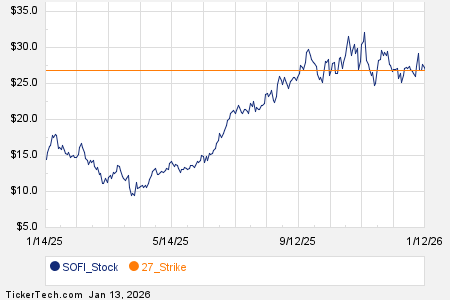Citadel’s Bold Moves: AI Stock Strategies from Ken Griffin
The quarterly Form 13F filings give investors crucial insights into the trading activities of top institutional investors, shaping perceptions in the market.
Form 13F is a mandatory filing with the Securities and Exchange Commission for institutional investors managing at least $100 million. This report sheds light on the buying and selling actions of some of the most influential money managers on Wall Street.
While Berkshire Hathaway, led by Warren Buffett, garners significant attention during these disclosures, Ken Griffin’s Citadel is another heavyweight investor that cannot be overlooked.

Image source: Getty Images.
Griffin’s Citadel has long captured the interest of investors, even as the firm often uses options to hedge its positions, a strategy not reflected in the 13F. Nevertheless, investors eagerly await the fund’s moves, especially during the latest quarter, where Citadel engaged in significant trades within the artificial intelligence (AI) sector.
Citadel Increases Investments in AI Leaders Palantir and Broadcom
The growing appeal of AI technology is evident, as it continues to transform various industries globally. This is why PwC analysts project that AI will contribute $15.7 trillion to the global economy by 2030.
During the June-ended quarter, Citadel’s filings indicated impressive increases in its positions: shares of AI data-mining expert Palantir Technologies (NYSE: PLTR) surged by 1,140%, while investments in AI networking giant Broadcom (NASDAQ: AVGO) rose by 64%.
The double-digit sales growth of these companies highlights their competitive edge and essential services.
Palantir operates through two primary platforms: Gotham and Foundry. Gotham supports mission-critical projects for governments, while Foundry aids businesses in organizing extensive data sets through AI and machine learning (ML). This unique offering affords Palantir stability and consistent cash flow.
On the other hand, Broadcom has positioned itself as a leading provider of networking solutions in AI-supported data centers. Its Jericho3-AI fabric connects an impressive number of graphics processing units (GPUs), enhancing computational performance, particularly during crucial decision-making processes.
Both firms also have diversified operations that ensure resilience. For instance, while Palantir integrates AI, it isn’t solely reliant on it. Even if AI experiences a downturn, the demand for their analytics services remains robust.
Broadcom similarly maintains a broad portfolio, offering wireless chips for mobile devices and essential components for industrial functionalities, thereby lessening its dependence on AI alone.
However, not all AI stocks were favored by Citadel in the recent quarter.

Image source: Getty Images.
Citadel Reduces Nvidia Holdings by 79%
While many AI stocks are thriving, Citadel sold off 79% of its shares in Nvidia (NASDAQ: NVDA) as of November 8, 2023. It’s essential to note that specific hedges may not be reported in the 13F.
Nvidia has skyrocketed, adding over $3 trillion in market capitalization this year. Investors appreciate the company’s strong foothold in AI-GPUs, which are pivotal for AI applications and data management.
According to TechInsights, Nvidia accounted for 98% of GPUs distributed to data centers during 2022 and 2023. The company now faces significant backlogs for its flagship products, signaling strong demand and pricing leverage.
Despite this growth, several factors may have prompted Citadel to reduce its Nvidia stake.
Historically, many technology sectors face severe corrections, especially in their early stages. The lack of clear guidance from businesses on their AI investments serves as a cautionary tale of potential pitfalls.
Furthermore, competition is intensifying, with major clients developing their own AI-GPU solutions, which may diminish Nvidia’s market presence despite maintaining its performance advantages. Additionally, noteworthy insider trading trends at Nvidia raise questions about confidence levels among company executives; there have been no open-market purchases by insiders in almost four years.
In summary, Nvidia must navigate significant challenges at its current valuation.
Don’t Miss This Second Chance at a Potentially Lucrative Opportunity
Feeling like you’ve missed out on investing in successful stocks? There may still be opportunities ahead.
Our analytical team occasionally identifies a company ripe for investment, labeled a “Double Down” stock. For instance:
- Amazon: an early investment of $1,000 back in 2010 would now be valued at $23,446!*
- Apple: a $1,000 investment made in 2008 would have grown to $42,982!*
- Netflix: if you invested $1,000 when we recommended it in 2004, it would now be worth $428,758!*
Currently, we are emphasizing “Double Down” alerts for three exceptional companies, presenting a potentially rare investment chance.
See 3 “Double Down” stocks »
*Stock Advisor returns as of November 4, 2024
Sean Williams has no position in any of the stocks mentioned. The Motley Fool has positions in and recommends Advanced Micro Devices, Berkshire Hathaway, Nvidia, and Palantir Technologies. The Motley Fool recommends Broadcom. The Motley Fool has a disclosure policy.
The views and opinions expressed herein are the views and opinions of the author and do not necessarily reflect those of Nasdaq, Inc.






